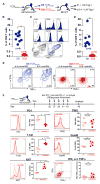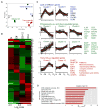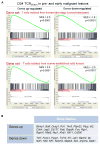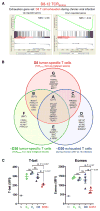Tumor-Specific T Cell Dysfunction Is a Dynamic Antigen-Driven Differentiation Program Initiated Early during Tumorigenesis
- PMID: 27521269
- PMCID: PMC5119632
- DOI: 10.1016/j.immuni.2016.07.011
Tumor-Specific T Cell Dysfunction Is a Dynamic Antigen-Driven Differentiation Program Initiated Early during Tumorigenesis
Abstract
CD8(+) T cells recognizing tumor-specific antigens are detected in cancer patients but are dysfunctional. Here we developed a tamoxifen-inducible liver cancer mouse model with a defined oncogenic driver antigen (SV40 large T-antigen) to follow the activation and differentiation of naive tumor-specific CD8(+) T (TST) cells after tumor initiation. Early during the pre-malignant phase of tumorigenesis, TST cells became dysfunctional, exhibiting phenotypic, functional, and transcriptional features similar to dysfunctional T cells isolated from late-stage human tumors. Thus, T cell dysfunction seen in advanced human cancers may already be established early during tumorigenesis. Although the TST cell dysfunctional state was initially therapeutically reversible, it ultimately evolved into a fixed state. Persistent antigen exposure rather than factors associated with the tumor microenvironment drove dysfunction. Moreover, the TST cell differentiation and dysfunction program exhibited features distinct from T cell exhaustion in chronic infections. Strategies to overcome this antigen-driven, cell-intrinsic dysfunction may be required to improve cancer immunotherapy.
Copyright © 2016 Elsevier Inc. All rights reserved.
Figures






References
-
- Barber DL, Wherry EJ, Masopust D, Zhu B, Allison JP, Sharpe AH, Freeman GJ, Ahmed R. Restoring function in exhausted CD8 T cells during chronic viral infection. Nature. 2006;439:682–687. - PubMed
Publication types
MeSH terms
Substances
Grants and funding
LinkOut - more resources
Full Text Sources
Other Literature Sources
Medical
Molecular Biology Databases
Research Materials

